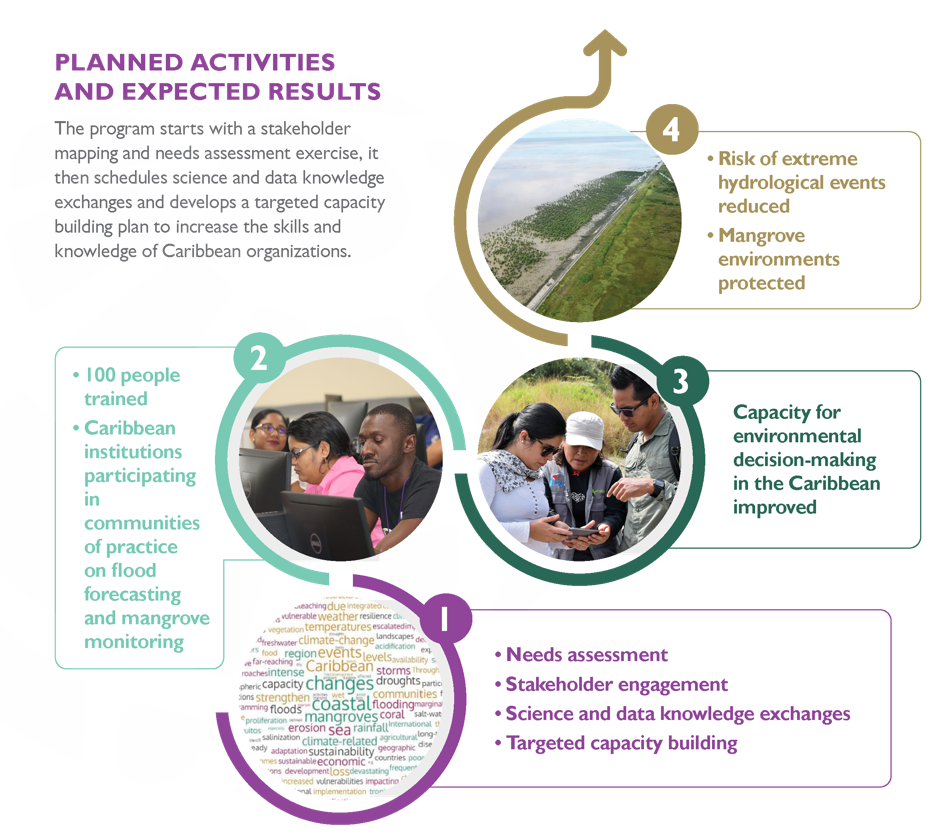Collaboration with Caribbean Countries to Combat Climate Change
2-year activity to reduce risks of extreme hydrological events and protect mangrove environments
With additional funding from USAID for a 2-year period covering 2022 and 2023, SERVIR-Amazonia is broadening the geographic impact of its Program by providing training and facilitating technical engagement with government, universities, research institutions, and NGOs in the Caribbean.
SERVIR-Amazonia will identify stakeholders and their capacity development needs in two thematic areas:
- Forecasting and monitoring of hydro-meteorological events, and
- Monitoring and evaluation of land use and land cover changes in mangrove
A priority will be to foster inter-institutional collaboration and interaction among stakeholders, and to strengthen the capacities that are necessary to develop sustainable geospatial applications.
Two examples of geospatial solutions developed by SERVIR-Amazonia with its partners
SERVIR uses a service approach bringing diverse stakeholders together to identify local development problems and co- design solutions that use satellite data, Earth science, and geospatial technologies. The resulting solutions are tailored, need-based decision-support products (tools, data sets, training resources and capacity building activities).
- Improve resilience and reducing risk of extreme hydrological events
In close collaboration and through intensive capacity strengthening interventions with hydrometeorological institutions in Brazil, Ecuador, Colombia, and Peru, SERVIR-Amazonia introduces innovative tools and forecasting methodologies (including more accurate information about timing, magnitude, and impact), to increase understanding of risks and support greater resilience for flood disasters. The service allows stakeholders to investigate forecast-based financing methods, which will increase their ability to prepare and respond to flood disasters. Furthermore, the hydroinformatics tools train stakeholders to understand past river flooding patterns and how the hydrological basin is integrated beyond political borders. This activity is led by NASA’s Applied Science Team led by Jim Nelson of the Environmental Modeling Laboratory (EMRL) at Brigham Young University (BYU). Read more
- Better manage fragile mangrove environments
SERVIR-Amazonia has been working with the National Agricultural Research and Extension Institute (NAREI) of Guyana, the Alliance of Bioversity International-CIAT, and the Spatial Informatics Group (SIG) to develop a monitoring and reporting system for tracking the extent and structure of coastal mangroves in Guyana using Synthetic Aperture Radar (SAR) and other remote sensing resources. This service will help the Guyanese government and civil society to manage better their fragile mangrove environments, by: 1) acting on hotspots of deforestation and stop them on time; 2) engaging in land-use planning, policy-making, and actions that protect mangroves from being converted to other land uses; and 3) planning mangrove protection efforts for farmers in low-lying coastal regions. The service contributes to larger efforts of forest and biodiversity conservation in Guyana. Read more
The Program will facilitate technical and research exchanges, provide training in geospatial services and applications, and share SERVIR-Amazonia’s unique strategic approach for the co-development and delivery of geospatial services and products. The activity spans over a 2-year period and initially covers Antigua and Barbuda, Dominica, Dominican Republic, Grenada, St. Kitts and Nevis, Saint Lucia, St. Vincent and the Grenadines, Barbados, The Bahamas, Trinidad and Tobago, Suriname, and Jamaica.
Contact: Paula Paz, Caribbean User Engagement Coordinator, Alliance Bioversity International – CIAT, p.a.paz@cgiar.org

Related News
What we Tweet
What we Read
- La ‘I Cumbre Amazónica de Periodismo y Cambio Climático 2022’ estará en la 9.ª edición de la Semana de América Latina y el Caribe
- Fulbright Amazonia Initiative 2022-2024
- #SERVIRAmazonia : 22 mujeres latinoamericanas SIG fortalecen sus capacidades de liderazgo y toma de decisiones en el trabajo, en la Universidad Estatal de Arizona
- Using your own data in CEO: Connecting GEE raster data
- Seeds of hope: How nature inspires scientists to confront climate change
- Home - Caribbean Meteorological Organization
- Home
- Ministry of Planning and Development
- Paper on Hybrid (EN)
- Lista Verde Amazonía



